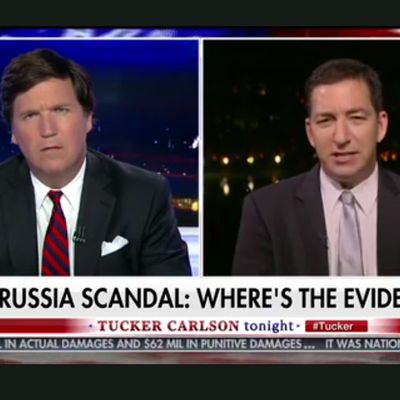
There once was a time when right-wing conspiracy theorists flourished, argues Glenn Greenwald. “But those people have been largely scorned and relegated to obscurity. The new conspiracy theorists — the ones who casually suggest that when a plane crashes, it is really a secret attempt by Putin and Trump to silence one of the passengers (who wasn’t even a passenger) — are found not on far-right websites, but on MSNBC and at Harvard Law School.”
The right’s conspiracy theorists have been relegated to obscurity? Really? Because I can think of a number of counterexamples. Some of them have influential platforms, or even extremely high-level jobs in the federal government.
This passage reveals a great deal about Greenwald’s peculiar approach to the Russia investigation. When evidence first appeared in 2016 linking Russia to hacking of Democratic emails, and the Trump campaign to Russia, Greenwald dismissed the whole question as an absurd, neo-McCarthyite smear. “Democrats seem to have one tactic with their adversaries and enemies, which is to accuse them of being Russian agents,” he explained, so they concocted a conspiracy theory, which was embraced by a liberal elite in alliance with “a shadowy, secretive world of intelligence and military operatives.” In fact, he believed, Clinton was just as in cahoots with Russia as Trump, and there was “a very extreme dearth of evidence” Russia even had anything to do with the hacks.
If you have been following the news in organs of the dreaded coastal Establishment, like the Washington Post and New York Times, you have seen Greenwald’s claims dismantled piece by piece. Russia’s responsibility for the hacks is no longer in question, and the connections between Trump’s campaign and Russia keep widening.
If you have been following the news from Greenwald, through his columns, tweets, and appearances on Fox News, you have received a different impression altogether. The nutty conspiracy theories about Trump and Russia just keep getting nuttier as the left loses its mind in a desperate bid to discredit the election.
How does Greenwald tell this story? His method relies on a fixation with the foibles of the left, combined with blotting Trump and the entire American right out of his mind.
Greenwald is an intelligent person, and the failures he identifies among the liberal media are mostly very real. In 2016, the Washington Post published a hazy report that the hacking of a Vermont power plant may have been the work of Russia. In spring, 2017, the New York Times published an op-ed by British former member of Parliament and conspiracy theorist Louise Mensch. Both episodes were serious mistakes. But very large publications with huge numbers of reporters and editors will occasionally make mistakes.
The fallout to each mistake revealed the seriousness of the two publications. The Post very quickly corrected its mistaken reporting about the fast-moving power-grid hack. News reporters at the Times publicly attacked Mensch’s claims. She has not appeared in the Times since, nor has either newspaper published any significantly erroneous reporting on the Russia story. Indeed, her influence has shrunk as she has been renounced by liberals like the Center for American Progress, the New Republic, and elsewhere. That Greenwald has continued to bring up these two episodes over and over should tell us not that the Times and Post are easy marks for anti-Trump conspiracy theories, as Greenwald says, but just the opposite. If they were so susceptible to conspiracy theories about Russiagate, he would have more examples available.
Instead, Greenwald’s search for evidence of the vast liberal conspiracy against Trump has led him to ever more marginal targets. His most recent column focuses on the conspiratorial tweeting of Laurence Tribe, a Harvard law professor who has some unsound views, including a side gig as paid advocate for the coal industry. Greenwald recently equated some hyperventilating tweets by a biology professor with the abuses of power committed by J. Edgar Hoover:
If you subscribe to Greenwald’s worldview, this makes perfect sense. The sinister powers of the deep state have been assumed by powerful figures in academia, who have cast a pall of suspicion equivalent to that of Joseph McCarthy. It is of course important to keep one’s own side honest and to prevent conspiracy theories or bad arguments from taking hold.
The problem is that the search for anti-Trump conspiracy theories is the whole of Greenwald’s analysis. He sees, or allows himself to see, nothing but crazy charges against Trump, to the point where there is no room in his field of vision for Trump himself. And so it seems obvious for him to casually observe that the conspiracy theories of the far right have disappeared, when in reality they have more power and influence than ever before.






























